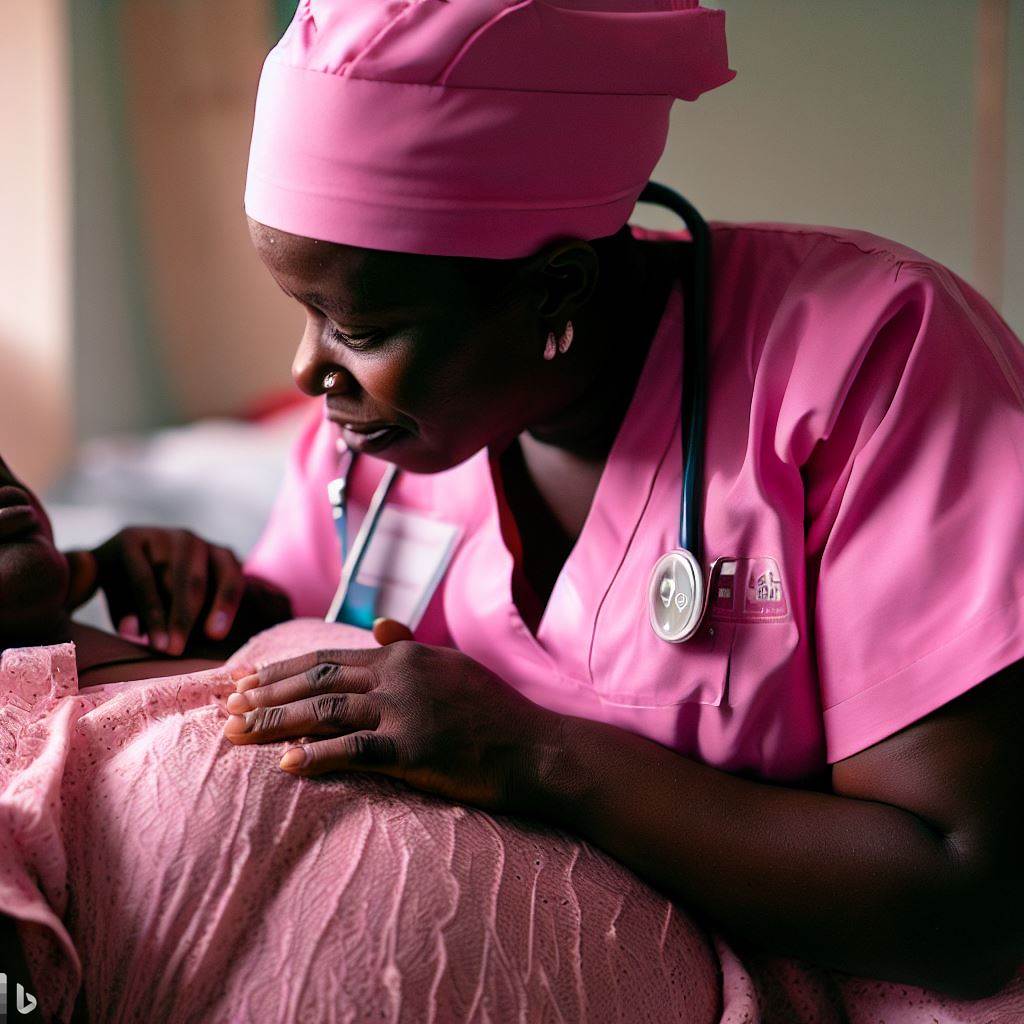Introduction
Nurse midwives in Nigeria play a crucial role in providing maternal and newborn care.
- The significance of nurse midwives in the healthcare system cannot be overstated.
- They provide critical support to pregnant women and ensure safe deliveries.
- Their expertise in prenatal and postnatal care is essential for the well-being of both mothers and infants.
However, despite their invaluable contributions, nurse midwives in Nigeria face numerous challenges that hinder their effectiveness.
In this blog post, we will discuss these current challenges and explore potential solutions to improve their work environment and impact.
Background information on nurse midwives in Nigeria
Definition and scope of practice
- Nurse midwives in Nigeria are healthcare professionals who provide primary healthcare services to women and newborns.
- They are registered nurses who have undergone specialized training in midwifery to provide comprehensive care during pregnancy, labor, and postpartum.
- Their scope of practice includes antenatal care, delivery assistance, postnatal care, family planning, and health promotion.
Training and education requirements
- Registered nurses in Nigeria can pursue additional training in midwifery to become nurse midwives.
- They can obtain this specialization through accredited institutions, which offer diploma, undergraduate, or postgraduate programs in midwifery.
- These programs equip nurse midwives with the necessary skills and knowledge to provide safe and quality care.
Roles and responsibilities
- Nurse midwives play a crucial role in ensuring the health and well-being of women during pregnancy and childbirth.
- They conduct prenatal examinations, monitor fetal development, and provide counseling on nutrition and healthy lifestyle choices.
- During labor, nurse midwives provide support and guidance, administer pain relief, and assist with deliveries.
- Postpartum, they assess the health of the mother and newborn, offer breastfeeding assistance, and educate on postpartum care.
- Nurse midwives also provide family planning services, including counseling and the provision of contraceptives.
Nurse midwives in Nigeria encounter significant challenges that impact their ability to deliver optimal care to women and newborns.
These challenges include limited resources, inadequate staffing, insufficient training opportunities, and cultural/societal barriers.
Healthcare facilities often lack proper equipment and infrastructure, compromising the quality of care and safety for patients and providers. Shortages of nurse midwives increase workloads and diminish care quality, especially in rural areas with higher maternal and infant mortality rates.
Limited access to continuing education hinders nurse midwives’ knowledge and skills development.
Societal norms and gender inequality can also limit their involvement and decision-making in healthcare processes. Addressing these issues necessitates a multi-faceted approach.
The Nigerian government must prioritize healthcare investments, recruit and retain nurse midwives in underserved areas, establish professional development programs, and raise public awareness about the importance of nurse midwifery.
Moreover, addressing gender disparities in the healthcare system is crucial for creating an enabling environment for nurse midwives to excel.
By overcoming these challenges, nurse midwives can significantly contribute to reducing maternal and infant mortality rates and enhancing reproductive healthcare outcomes in Nigeria.
Read: The Journey of Becoming a Nurse Midwife in Nigeria
Current challenges faced by nurse midwives in Nigeria
Lack of adequate resources and equipment
- Insufficient medical supplies
- Limited access to essential equipment
Nurse midwives in Nigeria often struggle with a scarcity of resources and equipment necessary for providing quality healthcare.
The inadequate supply of medical supplies makes it challenging for them to deliver safe and effective interventions.
Additionally, limited access to essential equipment further hampers their ability to provide comprehensive care and support to patients.
Inadequate staffing and high workload
- Shortage of nurse midwives
- Heavy patient load and long working hours
The shortage of nurse midwives in Nigeria significantly impacts their work environment. Due to the limited number of professionals, there is a heavy patient load, resulting in long working hours.
This situation not only adversely affects nurse midwives’ physical and mental well-being but also hinders their ability to provide personalized care to patients, diminishing the overall quality of healthcare services.
Cultural barriers and traditional practices
- Misconceptions about modern healthcare
- Influence of cultural norms and beliefs
Nurse midwives in Nigeria confront cultural barriers and traditional practices that can obstruct the provision of appropriate healthcare.
Misconceptions about modern healthcare often challenge nurse midwives’ efforts to educate communities about safe birthing practices and the benefits of prenatal care.
Moreover, deeply ingrained cultural norms and beliefs influence decision-making processes, leading to variations in the acceptance and utilization of midwifery services.
Limited career development opportunities
- Lack of professional growth and advancement
- Limited access to specialized training
Nurse midwives in Nigeria face restricted career development opportunities, hindering their professional growth and advancement.
The lack of avenues for progression limits their ability to acquire new skills and knowledge necessary for enhancing patient care.
Additionally, limited access to specialized training, such as advanced obstetric techniques or neonatal care, further restricts their capacity to address complex medical situations adequately.
Read: Roles and Responsibilities of Nurse Midwives in Nigeria

Impact of the challenges on nurse midwives and healthcare
The current challenges faced by nurse midwives in Nigeria not only affect the individuals themselves but also have significant implications for the healthcare system as a whole.
These challenges have a direct impact on patient safety, nurse midwives’ wellbeing, and the health outcomes of mothers and infants.
Increased risk to patient safety
- Nurse midwives face inadequate care due to resource constraints, such as limited medical supplies, equipment, and staffing.
- The potential for medical errors and complications is heightened when nurse midwives are overburdened and lack necessary resources.
Burnout and decreased job satisfaction
- The demands of the job, coupled with the scarcity of resources, contribute to mental and emotional strain among nurse midwives.
- The imbalance between work responsibilities and personal life negatively affects job satisfaction and overall wellbeing.
Negative implications for maternal and infant health outcomes
- The lack of resources and support puts mothers and infants at higher risk of mortality and complications during childbirth.
- Nurse midwives’ limited access to quality care and interventions hinders the provision of optimal healthcare services.
The impact of these challenges on nurse midwives and the healthcare system cannot be understated.
When nurse midwives are faced with resource constraints, it becomes difficult for them to provide the level of care and attention that patients require.
This not only compromises the safety of patients but also undermines the trust and confidence in the healthcare system.
Furthermore, the continuous strain and burnout experienced by nurse midwives have long-term consequences.
The mental and emotional toll can lead to decreased job satisfaction, increased absenteeism, and even attrition from the profession.
This further exacerbates the shortage of skilled healthcare workers in Nigeria, negatively affecting the overall quality of care provided.
Additionally, the negative impact on maternal and infant health outcomes is alarming.
The higher maternal and infant mortality rates in Nigeria can be attributed, in part, to the challenges faced by nurse midwives.
Without adequate resources and support, the provision of timely and effective interventions becomes limited, leading to preventable complications and tragic outcomes.
In general, the current challenges faced by nurse midwives in Nigeria have significant implications for patient safety, nurse midwives’ wellbeing, and maternal and infant health outcomes.
Addressing these challenges requires a comprehensive approach that includes improving resource allocation, providing support systems for nurse midwives, and prioritizing healthcare investments.
Only through such measures can Nigeria ensure the delivery of quality healthcare services to its population and improve maternal and infant health outcomes.
Read: Balancing Work and Life as a Nurse Midwife in Nigeria
Initiatives and Potential Solutions
Strengthening healthcare infrastructure
- Investment in medical facilities and equipment
- Improvement of supply chain management
The first step towards addressing the challenges faced by nurse midwives in Nigeria is to strengthen the healthcare infrastructure.
Investment in medical facilities and equipment is essential to provide adequate resources for the delivery of quality care.
This includes equipping healthcare facilities with essential medical equipment such as ultrasound machines, delivery beds, and blood pressure monitors to enhance the efficiency and accuracy of healthcare delivery.
In addition to investing in medical facilities and equipment, there is a need to improve the supply chain management system.
This will ensure a steady supply of essential medicines, vaccines, and medical supplies to healthcare facilities.
Effective supply chain management will prevent shortages and stockouts, allowing nurse midwives to provide continuous and uninterrupted care.
Read: Occupational Therapy Schools: Where to Study in Nigeria
Addressing staffing shortages
- Recruitment and retention strategies
- Support for training and education
Staffing shortages pose a significant challenge to nurse midwives in Nigeria. To address this issue, recruitment and retention strategies need to be implemented.
This includes attracting more individuals to pursue a career in nursing and midwifery through awareness campaigns and incentives.
Additionally, measures such as competitive salaries, career progression opportunities, and a supportive work environment can help retain qualified nurse midwives.
Support for training and education is also crucial to address staffing shortages.
Providing scholarships and financial assistance for nursing and midwifery students will encourage more individuals to enter the healthcare profession.
Additionally, continuous professional development opportunities should be available to nurse midwives to enhance their skills and knowledge.
Promoting cultural sensitivity and awareness
- Community engagement and education programs
- Collaboration with local leaders and traditional practitioners
Cultural sensitivity and awareness are essential for nurse midwives working in diverse communities in Nigeria.
Community engagement and education programs can help promote understanding and acceptance of healthcare practices.
These programs can involve sharing information about the role of nurse midwives, addressing misconceptions, and providing culturally appropriate care.
Collaboration with local leaders and traditional practitioners is also important in promoting cultural sensitivity.
By working together, nurse midwives can gain valuable insights into local customs and beliefs surrounding childbirth.
This collaboration can help bridge the gap between traditional practices and evidence-based care, ensuring safe and respectful maternity services.
Enhancing professional development opportunities
- Continuing education and advanced training programs
- Advocacy for nursing midwifery associations
Continuous professional development is vital for nurse midwives to stay updated with the latest advancements in healthcare.
Continuing education and advanced training programs should be made accessible to nurse midwives, allowing them to expand their knowledge and skills.
This can be achieved through workshops, conferences, and online learning platforms.
Advocacy for nursing midwifery associations is essential to ensure the interests and rights of nurse midwives are protected.
These associations can play a vital role in advocating for improved working conditions, regulatory reforms, and policy changes that directly impact nurse midwives.
By fostering professional solidarity, nurse midwives can work towards creating a positive and supportive work environment.
In summary, addressing the current challenges faced by nurse midwives in Nigeria requires a multi-faceted approach.
Strengthening healthcare infrastructure, addressing staffing shortages, promoting cultural sensitivity, and enhancing professional development opportunities are crucial steps towards ensuring high-quality maternal and newborn care in the country.
Read: Advancement Opportunities for Nurse Midwives in Nigeria
Conclusion
Recap of the challenges faced by nurse midwives in Nigeria
- Limited access to education and training opportunities.
- Inadequate staffing and high workload.
- Poor working conditions, including lack of necessary equipment and supplies.
- Low salaries and lack of career development opportunities.
- Limited support from the healthcare system.
Call to action for stakeholders, policymakers, and the healthcare community
- Invest in education and training programs for nurse midwives.
- Improve staffing levels and workload distribution.
- Upgrade working conditions and provide necessary resources.
- Enhance salary and benefits packages for nurse midwives.
- Establish policies that support and promote the role of nurse midwives in healthcare.
Hope for positive changes to improve the working conditions and impact of nurse midwives in Nigeria
Nurse midwives play a vital role in maternal and child healthcare in Nigeria, but they face numerous challenges that hinder their ability to provide quality care.
By addressing these challenges, stakeholders, policymakers, and the healthcare community can empower nurse midwives to make a greater impact on the health outcomes of women and children.
Together, we can create a healthcare system that values and supports nurse midwives, leading to improved maternal and child health in Nigeria.




